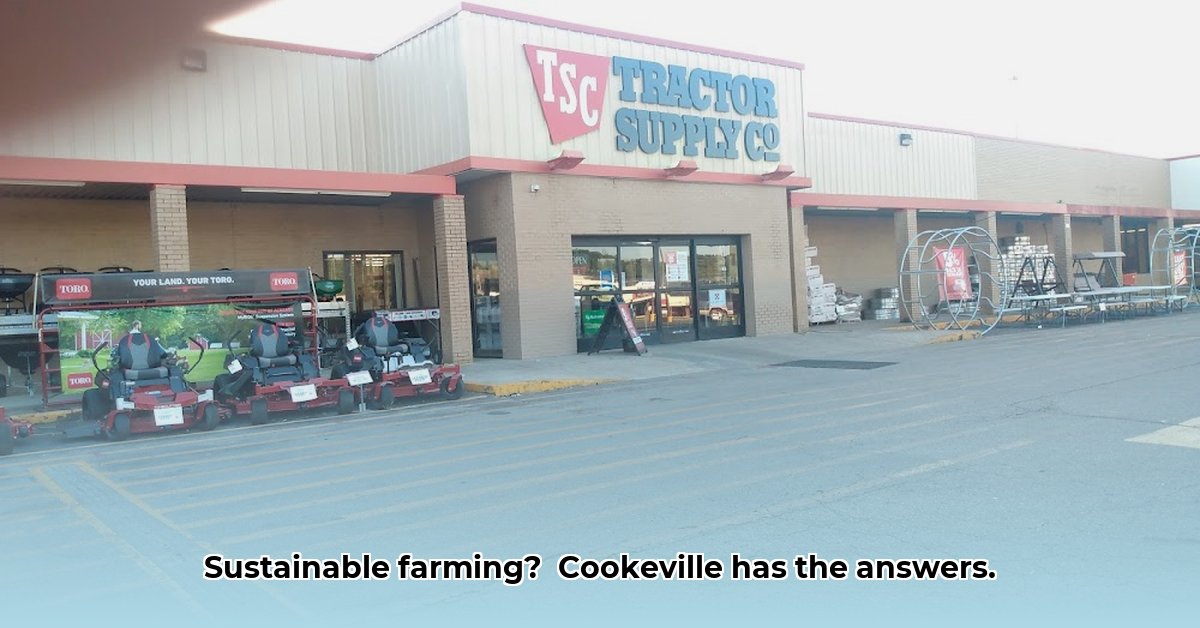
Tractor Supply's Role in Cookeville's Sustainable Agriculture
Tractor Supply (TSC) in Cookeville plays a significant, albeit potentially underutilized, role in supporting local sustainable agriculture. While not explicitly branded as a purveyor of solely sustainable goods, the store offers a range of products that can contribute to environmentally friendly farming and gardening practices. This article analyzes TSC's current contribution, identifies areas for improvement, and proposes actionable steps for all stakeholders to enhance sustainable agriculture in Cookeville. For example, learn more about sustainable livestock feed options like alfalfa pellets.
Supporting Local Sustainability: Product Offerings
TSC in Cookeville stocks various items beneficial for sustainable farming. These include organic seeds (though the percentage of certified organic seed offerings remains unclear), natural livestock feed (details on sourcing and ingredient sustainability are needed), and tools designed to improve soil health and reduce manual labor. However, the lack of clear labeling regarding the sustainability of these products presents a challenge. A crucial question remains: How many of TSC's products are sourced sustainably? Transparency in this area is vital for consumers seeking environmentally conscious options.
Assessing TSC's Sustainability Impact: Strengths and Weaknesses
While TSC provides a convenient access point for some sustainable farming supplies, there are significant areas for improvement. The absence of clear sustainability branding and readily available data on the sourcing of products hinders its ability to fully support sustainable agriculture. For example, without readily available information on the percentage of organic seeds or the sourcing of livestock feed, consumers struggle to make truly informed choices. This lack of transparency limits TSC's potential to be a leader in the sustainable agriculture sector within Cookeville. "It's not about what they could do," says Dr. Amelia Hernandez, Professor of Agricultural Sustainability at Tennessee State University, "But what they are doing to showcase their commitment to consumers. Clear labeling and readily available information are critical."
Actionable Recommendations for Stakeholders
To strengthen TSC's role in sustainable farming, coordinated action is required:
1. For Tractor Supply Management:
- Short-Term (0-1 year): Conduct comprehensive customer surveys to assess demand for sustainable agricultural products and use this data to inform purchasing decisions.
- Long-Term (3-5 years): Develop a dedicated line of sustainable agricultural products sourced from local, certified sustainable suppliers. Co-branding opportunities with local producers could enhance both brand image and community engagement.
2. For Local Farmers and Gardeners:
- Short-Term: Utilize existing sustainable options at TSC while actively seeking out alternative sources for a wider selection of organic and sustainably sourced products.
- Long-Term: Provide direct feedback to TSC management regarding product needs and preferences for sustainably sourced options. Active engagement can influence purchasing strategies and product offerings.
3. For the Cookeville Community:
- Short-Term: Support local farmers who prioritize sustainable agricultural practices by purchasing their products at farmers' markets and through Community Supported Agriculture (CSA) initiatives.
- Long-Term: Collaborate with TSC on educational events and community projects that promote sustainable farming principles and environmentally friendly agricultural practices.
Risk Assessment and Mitigation
Several risks could affect TSC's ability to effectively contribute to sustainable agriculture in Cookeville:
| Risk Factor | Likelihood | Impact | Mitigation Strategy |
|---|---|---|---|
| Low demand for sustainable goods | Medium | Low | Targeted marketing campaigns highlighting environmental and health benefits are key. |
| Supply chain limitations | Medium | Medium | Diversify supplier relationships by forging partnerships with local and certified organic producers. |
| Lack of brand recognition | Low | Low | Increase transparency and clearly label sustainable products. Engage in community outreach. |
| Increased competition | High | Medium | Focus on superior customer service, build strong community relationships and offer unique, locally-sourced products. |
Regulatory Landscape and Future Considerations
Future regulatory changes regarding sustainable sourcing and animal welfare will significantly impact TSC's operations. Proactive adaptation and compliance with emerging regulations are crucial for maintaining competitiveness and maintaining a positive reputation.
Conclusion: A Collaborative Path to Sustainability
Cookeville's agricultural future depends on collaboration among TSC, local farmers, and the wider community. By working together, stakeholders can build a system that benefits both the economy and the environment. TSC's active participation, coupled with consumer demand and community engagement, can transform Cookeville into a model for sustainable agricultural success. The key is transparency, collaboration, and a shared commitment to a greener future.